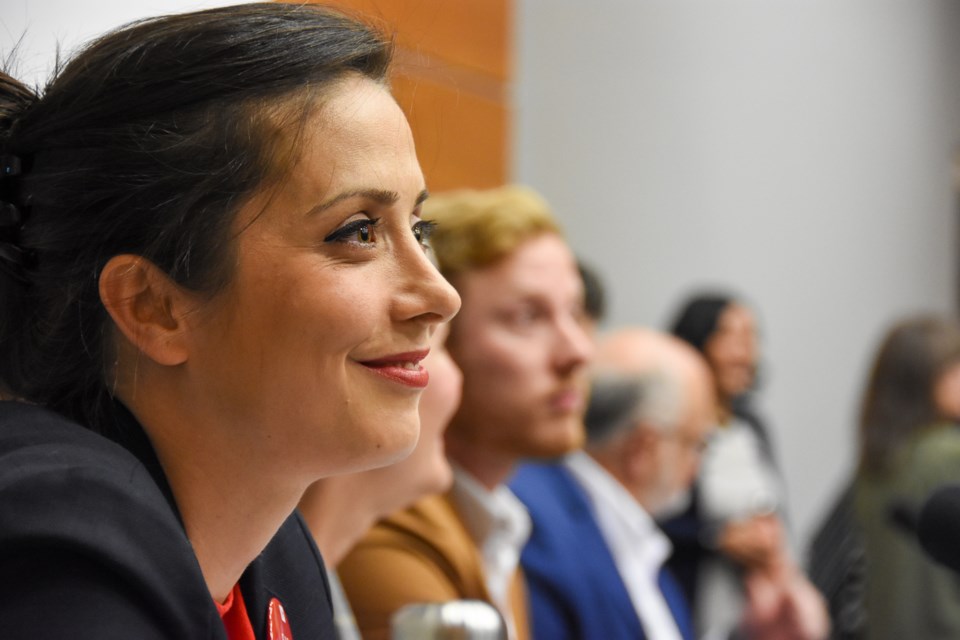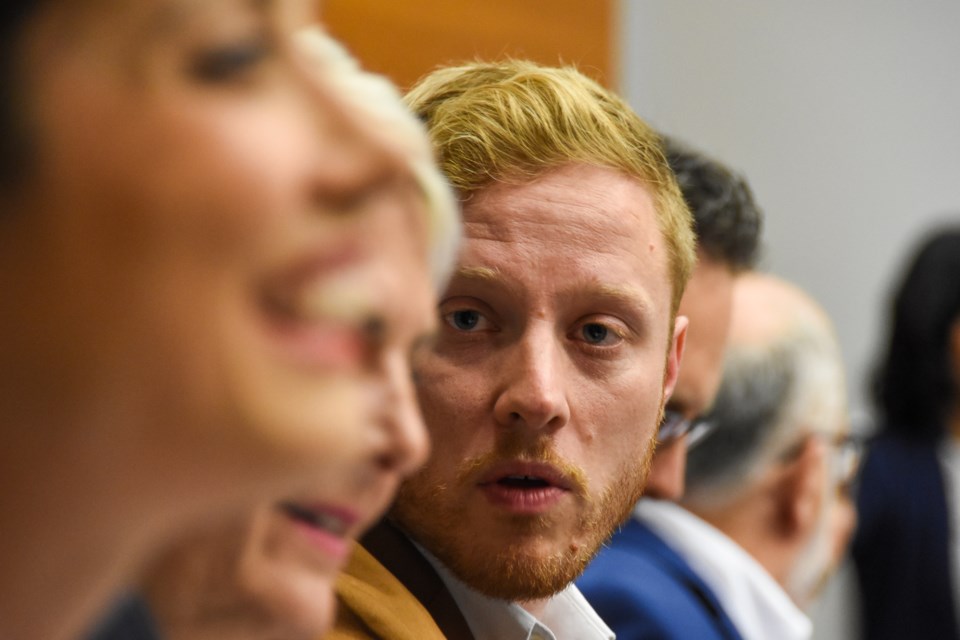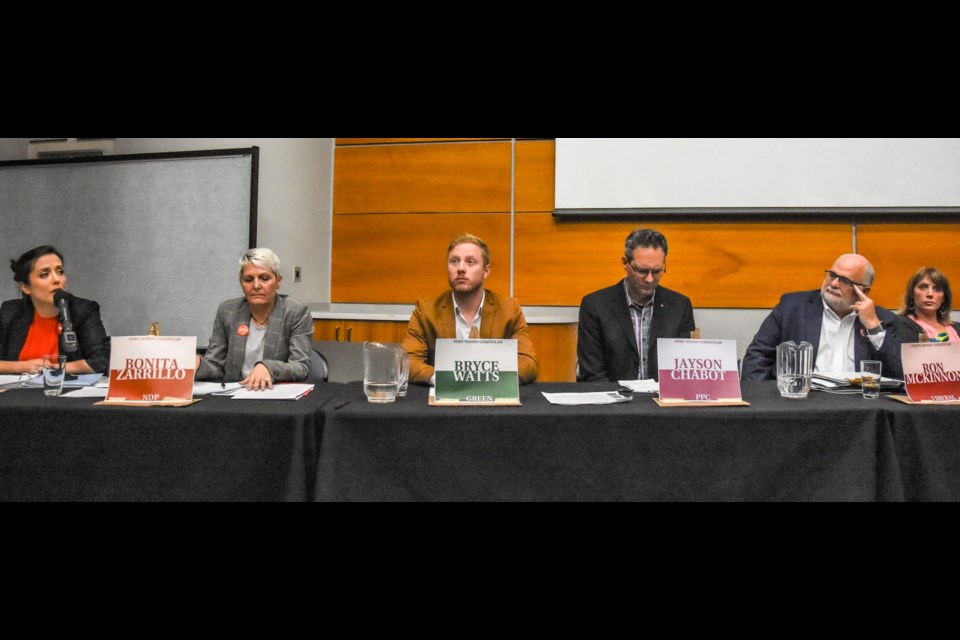Conservative candidates Nicholas Insley and Nelly Shin declined to attend the Tri-City all-candidates environment debate on Wednesday in an evening that offered few insights into how candidates would manage climate change if elected.
“The organizers didn’t facilitate a real debate where the candidates could challenge each other,” said Abbey Piazza, a representative from the environmental group Dogwood BC (formerly known as Dogwood Initiative), which claims 6,000 supporters in the Tri-Cities.
The debate was one of more than 100 environment debates held in ridings across the country. According to data collected by GreenPac, the non-partisan group that sparked the debates, Conservative candidates attended 39% of the debates, compared to 96% for the Liberals and Greens, 79% for the NDP and 43% for the People's Party of Canada.
Some of the biggest cries of frustration came when candidates were shut down from answering by moderators. Others came in response to People’s Party of Canada candidate Jayson Chabot when he denied climate change was man-made, warned of the danger of consensus science and blamed any shifts in climate on the sun. “That’s nonsense,” someone shouted from the crowd as others chuckled in disbelief.
Most candidates spent their time rattling off their respective platform. NDP and Green candidates reaffirmed their position against the Trans Mountain pipeline expansion, while the two Liberal candidates said it was but a drop in the bucket when you consider the impacts of emissions from transportation.
Watts, the Green candidate from Port Moody-Coquitlam, doubled down on identifying and protecting Canada’s richest habitats, and singled out the riding’s wetlands as an ideal candidate. Watts also affirmed he would go after large corporations, not just when it came to tax cuts to the fossil fuel industry, but also toward bolstering a regulatory agency to counter malpractice by agricultural research companies like Monsanto.
While Brad Nickason waxed poetic on the Green Party’s moral authority and ecological wisdom, NDP candidate Bonita Zarrillo and Liberals Ron McKinnon and Sara Badiei paid tribute to outgoing Port Moody-Coquitlam NDP MP Fin Donnelly for his work toward a shark fin ban and closed-containment aquaculture.

Coquitlam-Port Coquitlam NDP candidate Christina Gower, for her part, said she would focus on improving forestry practices, including how herbicides impact biodiversity, supporting a move toward Indigenous-managed protected areas, and spoke passionately about transitioning oil and gas workers to green jobs.
“Once we instil hope and allay fears of oil workers and show them that we're going to give them good jobs in renewable energy sources, I think we will slow that down,” she said.
Zarrillo drew applause when she turned the focus onto municipalities and how they are “desperate” for stable federal funding for transit, and threw a sharp barb at her counterparts on Coquitlam council.
“At the municipal level, it's an internal push and pull. If you have a progressive council, maybe they will do something. If you don't, they won’t. Unfortunately, in Coquitlam, we don't have a progressive council that allows us to do this type of thing,” she said.
When PPC candidate Jayson Chabot presented his case to limit immigration, characterizing refugees presenting themselves at the border as an act of fraud, both McKinnon and Badiei offered a strong rebuttal. “Refugees are refugees. They’re people who need help,” said McKinnon. “We must recognize refugees, immigrants — they are the lifeblood of our economy. We need them to grow, we need them to thrive.”
One of the biggest laughs of the night was when Chabot put out the question of how to reach out to people who don’t want to vote, and by implication, are climate change skeptics.
“It’s called consistent science-based messaging, and it’s called the Green Party of Canada,” answered Watts to a raucous applause.

While the audience was registered at 136, it was clear many had already made their decisions, their orbit around a specific candidate laid bare by the little orange, red and green pins on their sweaters and jackets.
But not everyone was decided. Following the debate — if it could be called that — The Tri-City News spoke with a handful of people who felt frustrated by what they had seen.
From her vantage point, Dogwood’s Abbey Piazza said she saw candidates muddling the big-picture questions on how to solve the climate crisis.
“A lot of times we can skirt over those issues and talk about planting trees and, you know, cigarette butts, for example,” said Piazza. “But I think that's not really getting at the key issues like larger corporations — they’re the big polluters and largest contributors to climate change.”
Sarah Corea, an 18-year-old business student at Douglas College and first-time voter, agreed, adding she was frustrated by the litany of promises without a clear sense of priority.
“They just breezed over a lot of the issues. That’s just what they do. I really wanted them to get down to the nitty-gritty,” she said. “It leaves me with more questions and more homework to do on what the other parties are going to bring to the table.”
Corea said she values her vote and wants to see it go toward a government that will reign in industrial practices that contribute the most to climate change.
“That's where the big footprints are,” she said. “When the industry set the example and the Tim Hortons actually start having their food waste be properly disposed of…When you see those examples, the families will do it and that's how it all gets started.”
On a personal level, Corea is hopeful, pointing to her two younger sisters, 14 and 16, who she says are even more active than her when it comes to advocating for action on climate change.
“Any transition period, that's the rockiness, that's the mud you’ve got to get through first to come on inside,” she said, pointing to what she says is a need to lower the voting age. “We're Gen Z, you don't even have a name yet. First-year college. Just turned 18. Still can't drink. But we can vote.”



